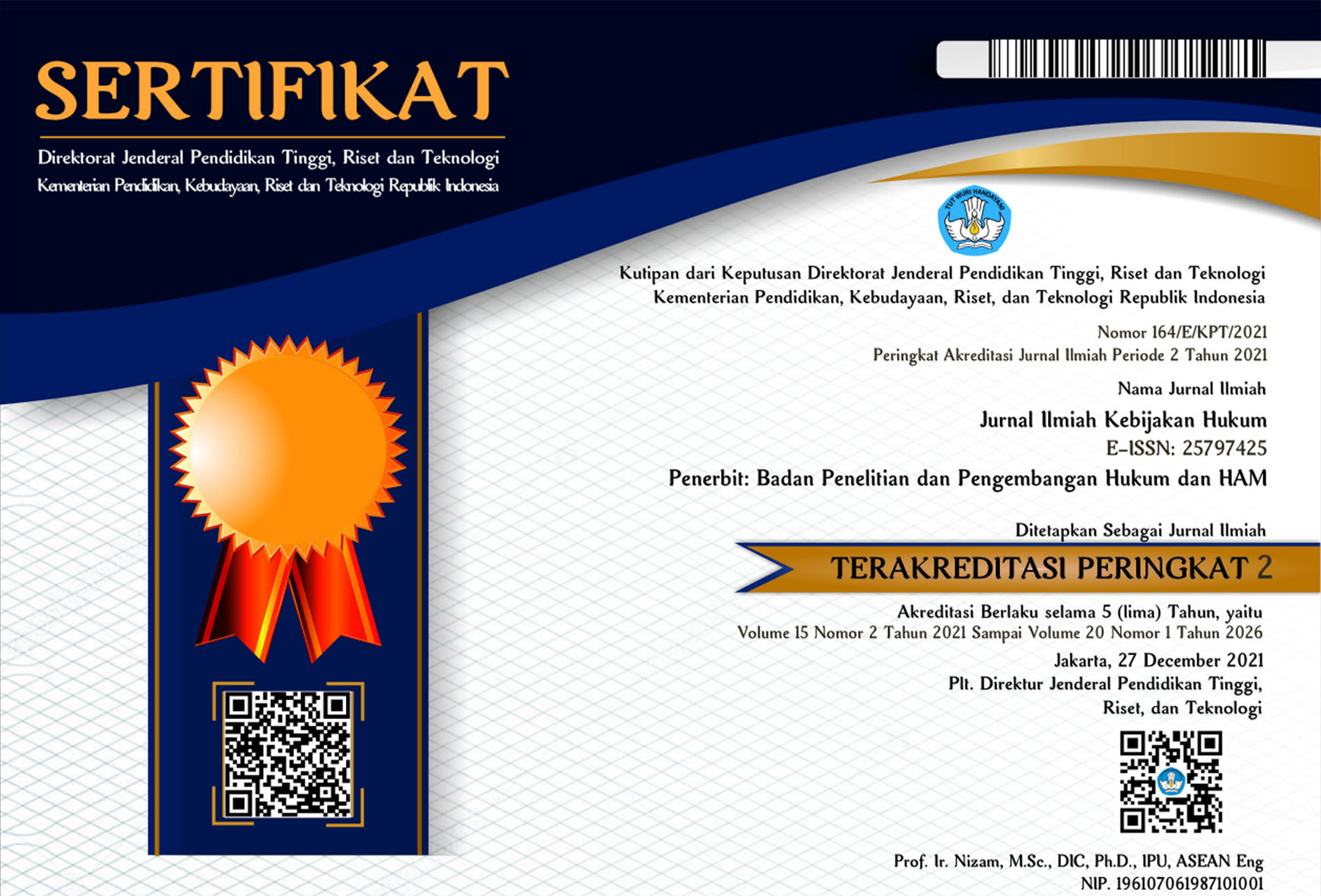Legal Reasoning: How Well-Known Marks are Positioned Through Legal Positivism
Abstract
Legal protection for well-known mark needs to be examined. Indonesia has tried to conform its legal system with international law, most notably the Paris Convention and the TRIPS Agreement. However, the court’s decision indicates that the well-known mark remains unfavourable. This paper aimed to analyse judges’ rationale when they rejected a lawsuit against a well-known trademark in Indonesia which was the trademark dispute of “Starbucks” and Pierre “Cardin”. This study was conducted using legal research methods and it examined legal materials from judges’ decisions and literature review. Therefore, knowing the judge’s rationale for dismissing the claim is essential. In the first case, the plaintiff’s documented evidence was insufficient to establish the respondent’s bad faith, but the judge’s justification for rejecting the lawsuit was insufficient either. Meanwhile, in the second case, the judge denied the claim based on ne bis in idem, which aims to reach legal certainty, so the judge can lean more toward positivism. The positivism requires clear rules so as not to cause multiple interpretations. However, trademark and geographical indication law does not give complete regulations on well-known marks. As a result, problems and conflicts frequently arise in practice when it comes to the protection of well-known marks.
Keywords
References
Agung, Indonesia Mahkamah. ‘Putusan Peninjauan Kembali Pierre Cardin No: 49 PK/Pdt.Sus-HKI/2018’, 2018.
Bagenda, Christina. ‘Filsafat Realisme Hukum Dalam Perspektif Ontologi, Aksiologi, Dan Epistemologi’.
Jurnal Ius Constituendum 7, no. 1 (18 April 2022): 115. https://doi.org/10.26623/jic.v7i1.4777.
Bagus, Lorens. ‘Kamus Filsafat, Jakarta: PT’. Gramedia Pustaka Utama, 1996.
Bankowski, Zenon, and James Maclean. The Universal and The Particular in Legal Reasoning. Ashgate Publising Limited, n.d.
Cohen, Morris L., and Kent C. Olson. Legal Research in a Nutshell. 6th ed. West Nutshell Series. St. Paul, Minn: West Pub. Co, 1996.
Conway, Gerard. ‘Levels of Generality in the Legal Reasoning of the European Court of Justice’. European Law Journal 14, no. 6 (November 2008): 787–805. https://doi.org/10.1111/j.1468-0386.2008.00440.x.
Ertekin, Larisa, Alina Sorescu, and Mark B. Houston. ‘Hands off My Brand! The Financial Consequences of Protecting Brands through Trademark Infringement Lawsuits’. Journal of Marketing 82, no. 5 (2018). https://doi.org/10.1509/jm.17.0328.
Feng, Shujie. ‘How Are Unregistered Trademarks Protected in China?’ IIC International Review of Intellectual Property and Competition Law 44, no. 7 (2013). https://doi.org/10.1007/s40319-013-0106-6.
Hahn, Ulrike, and Mike Oaksford. ‘The Burden of Proof and Its Role in Argumentation’. Argumentation 21, no. 1 (2007): 39–61. https://doi.org/10.1007/s10503-007-9022-6.
Hart, H. L. A. The Concept of Law. Third edition. Clarendon Law Series. Oxford, United Kingdom: Oxford
University Press, 2012.
Harun, Muhammad. ‘Philosophical Study of Hans Kelsen’s Thoughts on Law and Satjipto Rahardjo’s Ideas on Progressive Law’. Walisongo Law Review (Walrev) 1, no. 2 (2019). https://doi.org/10.21580/ walrev.2019.2.2.4815.
Hume, David. An Enquiry Concerning the Principles of Morals: A Critical Edition. Vol. 4. Oxford University Press, 2006.
Indonesia, Mahkamah Agung. ‘Putusan Kasasi Pierre Cardin No 557 K/Pdt.Sus-HKI/2015’, 2015.
———. ‘Putusan Sengketa Merek Starbucks No 51/Pdt.Sus/Merek/2021/PN Niaga Jkt.Pst.’, 2021.
Julyano, Mario, and Aditya Yuli Sulistyawan. ‘PEMAHAMAN TERHADAP ASAS KEPASTIAN HUKUM MELALUI KONSTRUKSI PENALARAN POSITIVISME HUKUM’. CREPIDO 1, no. 1 (31 July
: 13–22. https://doi.org/10.14710/crepido.1.1.13-22.
Kelsen, Hans. General Theory of Law & State. Law & Society Series. New Brunswick, N.J: Transaction Publishers, 2006.
———. ‘Pure Theory of Law and Analytical Jurisprudence, The’. Harv. L. Rev. 55 (1941): 44–44.
Kerikmäe, Tanel, and Sandra Särav. ‘Paradigms for Automatization of Logic and Legal Reasoning’, August 2017. https://www.researchgate.net/profile/Tanel-Kerikmaee/publication/319069131_Paradigms_for_ Automatization_of_Logic_and_Legal_Reasoning/links/598e16ff0f7e9bf4fbb017be/Paradigms-for- Automatization-of-Logic-and-Legal-Reasoning.pdf.
Lelieur, Juliette. ‘“ Transnationalising ” Ne Bis In Idem : How the Rule of Ne Bis In Idem Reveals the Principle of Personal Legal Certainty’. Utrecht Law Review 9, no. 4 (2013): 198–210.
MacCormick, Neil. Rhetoric and The Rule of Law: A Theory of Legal Reasoning. Oxford University Press, 2005. https://books.google.co.id/books?hl=en&lr=&id=VG1CAgAAQBAJ&oi=fnd&pg=PR8&dq=legal+re asoning+decision+judgement&ots=Ph3xDVbC6k&sig=y-JDxqJV37P4XzMcoG29LRdGD_g&redir_ esc=y#v=onepage&q=legal%20reasoning%20decision%20judgement&f=false.
Meadow, William, and John D. Lantos. ‘Expert Testimony, Legal Reasoning, and Justice’. Clinics in Perinatology 23, no. 3 (September 1996): 583–95. https://doi.org/10.1016/S0095-5108(18)30230-6.
Oktavinanda, Pramudya A. ‘Positivisme Hukum Dan Pendekatan Hukum Dan Ekonomi -- Suatu Pembelaan (Legal Positivism and Law and Economics -- A Defense’. SSRN Electronic Journal, 2013. https://doi. org/10.2139/ssrn.2314530.
Pratama, Wibi Pangestu. ‘Ada 1.184 Kasus Pelanggaran Haki Ditindak Di RI Sejak 2015’. Ekonomi.Bisnis.
Com, 2021.
Putra, Renggi Ardya. ‘Legal Possibility To Regulate Defensive Mark As Well-Known Mark Protection In Indonesia’. Journal of Intellectual Property 1, no. 1 (2018): 1–12.
Rahmatullah, Indra. ‘Filsafat Positivisme Hukum (Legal Positivisme)’. ADALAH 6, no. 1 (8 June 2022): 1–12. https://doi.org/10.15408/adalah.v6i1.26427.
Raz, Joseph. ‘Legal Principles and the Limits of Law’. The Yale Law Journal 81 (1972).
Samekto, F X Adji. ‘Menggugat Relasi Filsafat Positivisme Dengan Ajaran Hukum Doktrinal’. Jurnal Dinamika Hukum 12 (2012): 74–84.
Samudera, Teguh. ‘PENELUSURAN / Penalaran Hukum ( Legal Reasoning )’, no. i (n.d.). http://www. dppferari.org/wp-content/uploads/2019/04/Penelusuran-Penalaran-Hukum.pdf.
Schauer, Frederick. ‘On The Relationship Between Law and Legal Reasoning’. Oxford: Hart Pulishing, 2021, 1–27.
Setiawan, Agus. ‘Penalaran Hukum Yang Mampu Mewujudkan Tujuan Hukum Secara Proporsional’. Jurnal Hukum Mimbar Justitia 3, no. 2 (2017): 204–204. https://doi.org/10.35194/jhmj.v3i2.257.
Shidarta. Karakteristik Penalaran Hukum Dalam Konteks Keindonesiaan. CV. Utomo, 2006.
Soriano, L. M. ‘Environmental “Wrongs” and Environmental Rights: Challenging the Legal Reasoning
of English Judges’. Journal of Environmental Law 13, no. 3 (1 March 2001): 297–313. https://doi. org/10.1093/jel/13.3.297.
Stone, Alison. ‘Adorno, Hegel, and Dialectic’. British Journal for the History of Philosophy 22, no. 6 (2014). https://doi.org/10.1080/09608788.2014.952264.
Walker, Vern R. ‘Discovering the Logic of Legal Reasoning’. Hofstra Law Review 35, no. 4 (n.d.). Available at: https://scholarlycommons.law.hofstra.edu/hlr/vol35/iss4/2.
Weruin, Urbanus Ura. ‘Logika, Penalaran, Dan Argumentasi Hukum’. Jurnal Konstitusi 14, no. 2 (2017): 374–374. https://doi.org/10.31078/jk1427.
Zalta, Edward N, and GOTTLOB FREGE. ‘Stanford Encyclopedia of Philosophy-Winter 2011 Edition’.
URL=< Https://Plato. Stanford. Edu/Archives/Win2019/Entri Es/Frege, 2013.
Article Metric
Abstract this article has been read : 538 timesPDF file viewed/downloaded : 1272 times PDF (Bahasa Indonesia) file viewed/downloaded : 15 times
DOI: http://dx.doi.org/10.30641/kebijakan.2023.V17.55-68
Refbacks
- There are currently no refbacks.
Copyright (c) 2023 Achmad Achmad, Zakki adlhiyati

This work is licensed under a Creative Commons Attribution-NonCommercial 4.0 International License.
Jurnal Ilmiah Kebijakan Hukum Indexed by :










